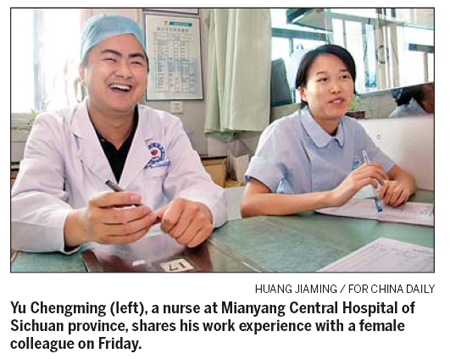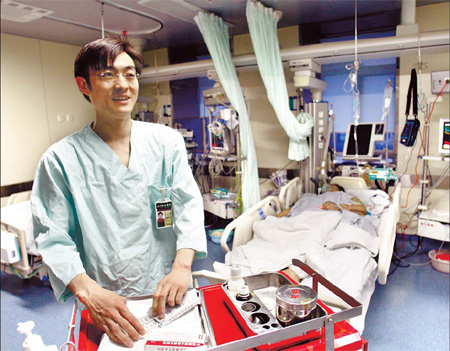Traditional breadwinners get neither high salary nor status.
Li Zunzhu saw another male colleague quit last month. The resignation was not the first he has seen during his nine-year career as a nurse at Peking Union Medical College Hospital's intensive care unit (ICU) - and it is unlikely to be the last.
His colleague decided to leave the job shortly after his girlfriend of eight years called off their wedding because her family refused to let her marry a male nurse.
"The girl's parents thought it was disgrace for a man to do nursing work that is menial and pays badly. My colleague was depressed and quit soon after the break-up," said Li, 31, who is now one of only three men still working in the 60-nurse ICU department.

As the nation prepares to celebrate International Nurses Day on Wednesday, health industry experts and those working in the profession said that little has changed in attitudes toward the country's male nurses, many of whom still experience severe discrimination.
"The discrimination comes from people's prejudices about the profession," said Ying Lan, deputy director of the Beijing Nursing Association. "People generally think nursing is a degrading job that requires no technical skills and offers a low salary. Women are considered more adept at doing this kind of work; people can't accept a man toweling a patient's body or cleaning up after them."
When Li was enrolled in Peking Union Medical College's school of nursing in 1998, he was one of only two men from 400 students. "I was surrounded by women. I felt like a boy who'd accidentally been sent to an all-girls school," he joked.
He recalled that when the class was divided into groups to practice injecting needles into each other's arms, none of his female classmates were willing to partner up with him. "I had to practice with the only other guy in the class," said the lean, 1.8-meter-tall man, who hails from Shandong province. "Maybe the girls thought us men were too clumsy and would hurt them."
The two men quickly became the most popular test subjects ahead of the final injection examination as the girls realized male veins are thicker and therefore easier to find with a needle.
The real pain, however, did not begin until after Li graduated in 2001 and started his job as the first male nurse to ever work in the ICU at Peking Union Medical College Hospital, one of China's most renowned hospitals.
People were always surprised that there were men working as nurses and some female patients refused to allow him to perform any gynecological check ups, he said.
For almost a decade, Li, whose wife is also a former nurse, has regularly worked more than 13 hours a day giving injections and taking blood samples, fitting catheters, and helping patients to wash and use the toilet, among many other things.
No matter how hard a nurse works, though, they will never receive the same respect as a doctor, he said. "People despise nurses because they believe the work is of a low status. It's even more shameful (in their eyes) when a man does this job," he said.
During his first couple of years in the job, Li said he used to dodge the question when patients asked him if he was a doctor (male nurses do not wear caps like their female colleagues to distinguish them from the doctors). "Maybe I'm too sensitive but I could see the pity in their eyes when I told them I am not a doctor but a nurse."
Supporting stars
Nursing is far more complex than simply giving jabs and dispensing medicine, said Ying, who was a male nurse in the 1970s.
Not only do they need to report every detail of a patient's condition to the doctor so they can draw up a comprehensive treatment plan, they are also vital in the recovery process as they need to make sure a patient is developing both physically and mentally.
All nurses require intensive professional training and some even have master's degrees from medical schools, added Ying.
After three years in school, Li got his nursing certificate by passing a strict exam. He had to intern in the ICU department for more than a year before he was allowed to work on his own. During that period, he learned to evaluate the patients' conditions through recognizing and analyzing data from various medical equipment and monitors, and to dispense medicine under the guidance of a senior nurse.
 Li Zunzhu, 31, is one of three male nurses who work at Peking Union Medical College Hospital's intensive care unit. He has been a nurse for nine years. Zhang Wei / China Daily |
Now Li has his own interns to coach, and said he makes each one recite the name of the drug and dosage every time they provide an injection. "The smallest mistake is likely to be fatal," he said.
Women are generally regarded as more gentle and better at comforting people. However, Li feels that in the fast-paced, high-pressure world of ICUs, emergency rooms or operating rooms, male nurses have an advantage.
"In ICU, there are paralyzed patients that need to be moved or turned over quickly, which cannot usually be done by a female nurse on her own," he said, explaining why more men work in such departments.
Hospitals are also more willing to place male staff in these high-pressure environments because they require less communication with the patients or patients' families, thereby reducing the chances to a male nurse suffering abuse or discrimination. "Most people didn't mean to humiliate us but their words still hurt our feelings. Hospitals don't want their male nurses quitting because of this," added Li.
After the May 12 earthquake in Sichuan province in 2008 (the second anniversary falls on the same day as International Nurses Day), nearby hospitals sent their male nurses to the disaster zone to help rescue victims as it was believed they would work better in the harsh and dangerous environment, said Yu Mingcheng, a former male nurse with the Mianyang Central Hospital.
"Every five minutes after the earthquake, a truck full of at least 20 casualties drove up to our hospital. Several male colleagues and I had to carry the victims to the operating rooms," he said.
Although still few in numbers, male nurses are welcomed by the majority of hospitals in China, said Zheng Shanhai, an ICU doctor at China Meitan General Hospital in Beijing.
Women provide wonderful support but "it's undeniable that in some important operations that could last eight hours, male nurses are more likely (to have the stamina) to persist to the end," he said.
Nationwide, hospitals are hiring more men onto their nursing staff, (Zheng said his unit recently accepted a handful of male interns), yet experts say many quit just a few years into their career.
"It is becoming easier for them to find a job but it is just as hard to keep, due to the pressure from prejudice," said Zheng. "I have never seen a male nurse work for more than 10 years in the industry, while it is easy to find a doctor with decades of experience everywhere."
Ex-nurse Yu agreed and, although he only left the profession because he was promoted to an administrative position, said: "Most men change jobs because of social discrimination and poor salaries."
In his spare time, Yu now runs the China Nursing Forum, one of the largest online social networking groups for the country's nurses. Of the website's 100,000 registered users though, just 400 are men.
"About 40 percent of the male nurses that use the forum have talked about their desire to change to another job," said the part-time webmaster. "Once I asked eight male nurses - all students on a nursing training course that I run - about their career choice and only one said he didn't regret picking this profession."
When Yu was promoted in 2008 - a result of his outstanding performance during three years in the job - many of the male colleagues were jealous, he said. "They told me they loathed the endless cleaning and drug dispensing. The discrimination and poor salary is also torture for them and puts them under both mental and financial pressure."
As a rookie in 2005, Yu earned just 500 yuan ($70) a month. "Five years have passed and a nurse's monthly wage is no more than 1,500 yuan," he added.
Changing attitudes
To reduce running costs, many Chinese hospitals hire temporary staff, make the situation even more volatile, according to a 2005 report on nursing by the Ministry of Health.
Traditionally, men are still the main breadwinners in China - yet nursing fails to offer either the salary or the status. "One of my male colleagues told me he can earn more money working as a waiter in a small restaurant," said Yu. "Some male nurses can't find girlfriends because of their low incomes."
Similar to Li's experience in Beijing, when Yu began training as a nurse in Sichuan in 2002 he was the only man among 600 trainees. At the time, he believed a man's "physical advantage" would make it easier for male nurses to not only find a job but also excel in it.
Due to the increasingly serious employment situation in China, Yu and Li said they both chose the profession for the same reason. Yet a male nurse who did not want to be identified told China Daily he had no idea what was involved in nursing work before he studied it. Now, working in a mental hospital in Zhejiang province, he said he is tired of people's reaction to him and regrets his choice.
"Sometimes medical schools persuade boys to choose nursing in order to increase the employment rate, but the male students do not know the pressure until they eventually start in the job," said Yu. "The situation won't change unless people change their attitudes and nurses' pay is increased."
There are 1.74 million nurses in China, according to figures released by the Ministry of Health. Although there are no official statistics on how many are men, nursing association chief Ying estimated that they make up less than 1 percent. He said there is little hope of that number increasing rapidly over the next few years.
In March, Li won the 2010 Outstanding Nurse Award in Beijing. He was the man among 30 winners. "I don't know where my nursing work will take me," he said. "I'm just focusing on doing my job the best I can."